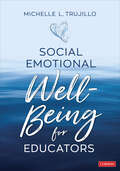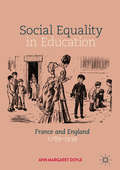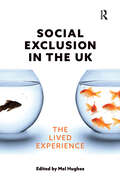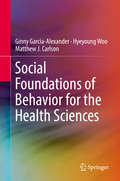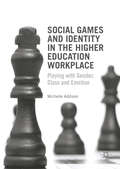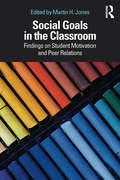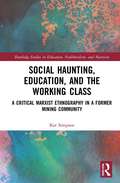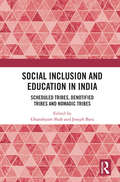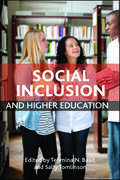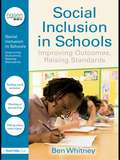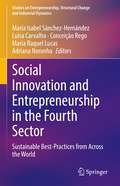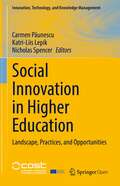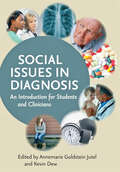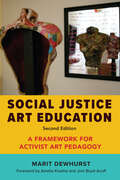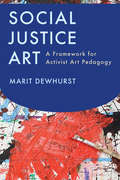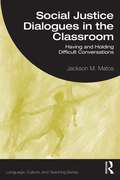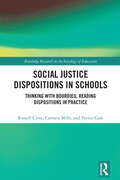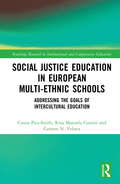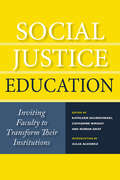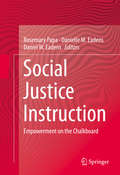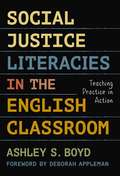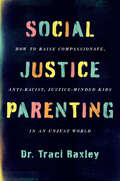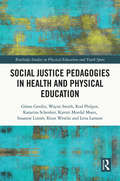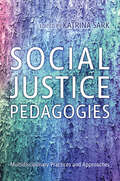- Table View
- List View
Social Emotional Well-Being for Educators
by Michelle L. TrujilloLearn how to take self-care off your to-do list! It’s been a rough couple of years for teachers and school leaders. Your ability to be resilient and concentrate on social-emotional learning has been put to the test and now you deserve relief—without the pressure of having yet one more thing piled on your plate. This book’s unique and compelling framework empowers you to practice self-care through thoughts and actions that are within your control, enhancing your well-being without taking on extraneous responsibilities. Features include A checklist for determining your baseline of strengths and needs Self-reflection questions, journaling opportunities, and action-planning exemplars A process for tracking, celebrating, and revising your own tangible objectives Teaching guidance for distance or hybrid education Strategies to share with your students It’s right there in the word: well-being! It isn’t a thing to do, but a way to be. When you integrate the principles of SEL into your everyday life, you’ll be a person of joy, peace, and gratitude — and a more inspired and empowered educator.
Social Equality in Education: France And England 1789 - 1939
by Ann Margaret DoyleThis book explores the development of education in France and England from the French Revolution to the outbreak of World War II. The author uses social equality as a framework to compare and contrast the educational systems of both countries and to emphasise the distinctive ideological legacies at the heart of both systems. The author analyses how the French Revolution prompted the emergence of an egalitarian ideology in education that in turn was crucial for propagating the values of equality, patriotism and unity. In tandem, the volume discusses the equally dramatic consequences of the Industrial Revolution for English society: while England led the world by 1800 in trade, commerce and industry, a strict form of liberalism and minimal state intervention impeded the reduction of educational inequality. This pioneering book will be of interest to students and scholars of educational equality as well as the history of education in France and England.
Social Exclusion in the UK: The lived experience
by Mel HughesIn UK society, there are cultural norms and assumptions that affect many marginalised groups and this book aims to address and challenge these through the lens of the people who have lived these experiences.Social Exclusion in the UK presents a range of lived experiences alongside a critical commentary on the impact of social stigma, exclusion and marginalisation on people's lives. This book's chapters are co-authored by people with lived experience and academics and are all underpinned by the Transformative Learning Theory developed by scholar Mezirow. The marginalised experiences discussed in this book include different types of substance users, care leavers, asylum seekers, offenders, HIV positive, those living in poverty or those who identify as transgender.What makes this book unique is that it gives a voice to those who have been the most affected by inequality - whether it's economic or social and health inequalities. Those affected are the least likely to be involved in shaping and informing responses to it and this lack of involvement risks the further exclusion of those who are already marginalised.A few of the ways this book aims to challenge this include: legitimising and prioritising lived experience expertise; fostering critical reflection of our own beliefs and assumptions and drawing on lived experience expertise to inform responses and solutions.
Social Foundations of Behavior for the Health Sciences
by Ginny Garcia-Alexander Hyeyoung Woo Matthew J. CarlsonThis textbook helps students in the health sciences prepare for the social foundations portion of the Medical College Admission Test (MCAT). It provides a solid understanding of the fundamental concepts, theories, and methodologies in sociology that the MCAT exam requires. This book offers a condensed overview of the sociological concepts covered during a 15 week semester. It helps students gain an understanding of the social foundations of behavior, and the social determinants of health within the professional context of medicine. Students are provided with the necessary basics in addition to case studies, learning and research activities, recommended external resources, and study questions. These are meant to develop pre-health students' understanding of the importance of the social factors that influence health outcomes. The featured activities contain various exercises using examples of sociology of health and medicine, including social factors shaping health, social relations between doctors and patients, and the health care system, among others. As a result, this book well informs not only those who wish to prepare for the MCAT to pursue a career in the health profession, but also anyone who is interested in social perspectives on health and medicine.
Social Games and Identity in the Higher Education Workplace
by Michelle AddisonWe allplay games at work - but have you ever wondered how your identity becomes boundup with game playing? This book is about employees in the Higher Educationworkplace and it provides an interpretation of why people act the way they doat work as an expression of game playing. It offers an insight into how peopletry to adapt and fit in at work by looking at how value is attached to certainidentities through the lens of class and gender. The figure of the 'chav', the 'emotional woman', 'TheGrafter', and 'Mrs. Bucket', are explored in detail as representations of whatkinds of people are permitted, or not, to fit in at work. These identities aretopical, and may even be familiar to readers, but the author's analysis of themchallenges why they exist, what function these identities serve at work, andwho is able to deploy and inscribe them as part of the games people play atwork.
Social Goals in the Classroom: Findings on Student Motivation and Peer Relations
by Martin H. JonesSocial Goals in the Classroom is the first volume to comprehensively examine the variety of students’ non-academic goals and motivations within the classroom. Each expertly written chapter defines and investigates a particular aspect of students’ social objectives before addressing related findings on academic performance, interpersonal outcomes, and directions for future research. Presented in three succinct and comprehensive parts, this book reviews, expands upon, and theoretically synthesizes current research on the many different social goals to offer readers a thorough understanding of non-academic desires and their consequences on learners’ educational experiences. Situated in evidence-based theory as well as real-world contexts such as ethnicity, sexual orientation, and social media, this insightful collection—ideal for graduate students, teachers, and researchers—explores how students' social motives influence their academic performance and peer relationships.
Social Haunting, Education, and the Working Class: A Critical Marxist Ethnography in a Former Mining Community (Routledge Studies in Education, Neoliberalism, and Marxism)
by Kat SimpsonBased on a critical Marxist ethnography, conducted at a state primary school in a former coalmining community in the north of England, this book provides insight into teachers’ perceptions of the effects of deindustrialisation on education for the working class. The book draws on the notion of social haunting to help understand the complex ways in which historical relations and performances, reflective of the community’s industrial past, continue to shape experiences and processes of schooling. The arguments presented enable us to engage with the ‘goodness’ of the past as well as the pain and suffering associated with deindustrialisation. This, it is argued, enables teachers and pupils to engage with rhythms, relations, and performances that recognise the heritage and complexities of working-class culture. Reckoning and harnessing with the fullness of ghosts is essential if schooling is to be refashioned in more encouraging and relational ways, with and for the working class. This text will benefit researchers, academics, and educators with an interest in the sociology of education, and social class and education in particular. Those interested in schooling, ethnography, and qualitative social research will also benefit from the book
Social Inclusion and Education in India: Scheduled Tribes, Denotified Tribes and Nomadic Tribes
by Ghanshyam Shah Joseph BaraThis book examines social inclusion in the education sector in India for scheduled tribes (ST), denotified tribes and nomadic tribes. It investigates the gaps between what was promised to the marginalized sections in the constitution, and what has since been delivered. The volume:• Examines data from across the Indian states on ST and non-ST students in higher, primary and secondary education;• Analyses the success and failures of education policy at the central and state level;• Brings to the fore colonial roots of social exclusion in education. A major study, the volume will be of great interest to scholars and researchers of education, sociology and social anthropology, development studies and South Asian studies.
Social Inclusion and Higher Education
by Tehmina N. Basit and Sally TomlinsonThis book is about the experiences of students in institutions of higher education from 'non-traditional' backgrounds. The expansion of Higher Education world-wide shows no signs of slowing down and there is already a large literature on who has access to higher education and to qualifications that offer higher life-time incomes and status. However to date there has been minimal focus on what happens to the students once they are in the institutions and the inequalities that they face. This book aims to fill this gap in the literature. The chapters demonstrate that the students and their families are finding ways of acquiring forms of capital that encourage and sustain their participation in higher education. Contributions from the UK, the USA and Australia reveal that the issues surrounding the inclusion of 'non-traditional' students are broadly similar in different countries. It should be read by all those leading, managing, or teaching in, institutions of higher education and all students or intending students whatever their background.
Social Inclusion in Schools: Improving Outcomes, Raising Standards (nasen spotlight)
by Ben WhitneyThis book provides the busy teacher with all the information they need to make social inclusion a reality within schools. By demonstrating how teachers and schools must work together to promote the wider welfare of all children, the book focuses particularly on the welfare of children on the margins of society who need the most protection. It shows how teachers can aim to reduce inequalities and maximise the learning opportunities available for these vulnerable children, whatever their background or social class. The author addresses key issues such as: attendance and achievement exclusion and behaviour safeguarding and child protection children at risk of missing education. By emphasizing the Every Child Matters agenda and the importance of joined-up partnership approaches with other professionals and agencies, this book is essential reading for all practitioners working to support pupils at risk of exclusion.
Social Innovation and Entrepreneurship in the Fourth Sector: Sustainable Best-Practices from Across the World (Studies on Entrepreneurship, Structural Change and Industrial Dynamics)
by Conceição Rego Maria Raquel Lucas María Isabel Sánchez-Hernández Luísa Carvalho Adriana Noronha“The fourth sector” consists of for-benefit organizations that combine market-based approaches of the private sector with the social and environmental aims of the public and non-profit sectors. This book examines successful experiences around the world in entrepreneurship in the fourth sector in recent times. The chapters also reveal the pivotal role of the public sector collaboration with private entities in solving the problems of humanity.
Social Innovation in Higher Education: Landscape, Practices, and Opportunities (Innovation, Technology, and Knowledge Management)
by Carmen Păunescu Katri-Liis Lepik Nicholas SpencerThis open access book offers unique and novel views on the social innovation landscape, tools, practices, pedagogies, and research in the context of higher education. International, multi-disciplinary academics and industry leaders present new developments, research evidence, and practice expertise on social innovation in higher education institutions (HEIs), across academic and professional disciplines.The book includes a selected set of peer-reviewed chapters presenting different perspectives against which relevant actors can identify and analyse social innovation in HEIs. The volume demonstrates how HEIs can respond to societal challenges, support positive social change, and contribute to the development of international public policy discourse. It answers the question ‘how does the present higher education system, in different countries, promote social innovation and create social change and impact’. In answering this question, the book identifies factors driving success as well as obstacles. Furthermore, it examines how higher education innovation assists societal challenges and investigates the benefits of effective social innovation engagement by HEIs.The interdisciplinary approach of the volume makes it a must-read for scholars, students, policy-makers, and practitioners of economics, education, business and management, political science, and sociology interested in a better understanding of social innovation.
Social Issues in Diagnosis: An Introduction for Students and Clinicians
by Annemarie Goldstein Jutel and Kevin DewUnderstanding the social process of diagnosis is critical to improving doctor-patient relationships and health outcomes.Diagnosis, the classification tool of medicine, serves an important social role. It confers social status on those who diagnose, and it impacts the social status of those diagnosed. Studying diagnosis from a sociological perspective offers clinicians and students a rich and sometimes provocative view of medicine and the cultures in which it is practiced. Social Issues in Diagnosis describes how diagnostic labels and the process of diagnosis are anchored in groups and structures as much as they are in the interactions between patient and doctor.The sociological perspective is informative, detailed, and different from what medical, nursing, social work, and psychology students—and other professionals who diagnose or work with diagnoses—learn in a pathophysiology or clinical assessment course. It is precisely this difference that should be integral to student and clinician education, enriching the professional experience with improved doctor-patient relationships and potentially better health outcomes.Chapters are written by both researchers and educators and reviewed by medical advisors. Just as medicine divides disease into diagnostic categories, so have the editors classified the social aspects of diagnosis into discrete areas of reflection, including• Classification of illness• Process of diagnosis• Phenomenon of uncertainty• Diagnostic labels• Discrimination• Challenges to medical authority• Medicalization• Technological influences• Self-diagnosisAdditional chapters by clinicians, including New York Times columnist Lisa Sanders, M.D., provide a view from the front line of diagnosis to round out the discussion. Sociology and pre-med students, especially those prepping for the new MCAT section on social and behavioral sciences, will appreciate the discussion questions, glossary of key terms, and CLASSIFY mnemonic.
Social Justice Art Education, Second Edition: A Framework for Activist Art Pedagogy (Routledge Research In Arts Education Ser.)
by Marit DewhurstExpanding on a groundbreaking framework, this revised edition connects activist art education with current campaigns for social justice. Nearly a decade after Social Justice Art, innovative arts educator Marit Dewhurst returns with a new edition offering further guidance for developing meaningful, justice-centered art programming. Reflecting on a growing interest in the field and its place within larger movements that uses creative strategies to drive social change, Dewhurst brings new research to bear on her interviews with educators, artists, and students to suggest clear, actionable approaches to facilitating the collaborative process of creating art for social change. In Social Justice Art Education, Dewhurst examines how to teach art-making to address systems of injustice, how to talk about the process, and the role of activist art projects not only in school classrooms but also within museum education, afterschool education, and other youth programming. In a new chapter, she introduces essential steps that prepare educators to engage in this work: recognizing power differentials, identifying community strengths, and nurturing relationships. Through real-world examples, Dewhurst highlights three key learning processes—connecting, questioning, and transforming—and frames a critical arts pedagogy that incorporates collaboration, inquiry-based discussion, and changemaking into arts curricula. This invigorating work provides common language and concrete support for educators and others who want to expand and refine their practices, empowering students through liberatory education that aims to inspire social change.
Social Justice Art: A Framework for Activist Art Pedagogy
by Marit DewhurstIn this lively and groundbreaking book, arts educator Marit Dewhurst examines why art is an effective way to engage students in thinking about the role they might play in addressing social injustice. Based on interviews and observations of sixteen high schoolers participating in an activist arts class at a New York City museum, Dewhurst identifies three learning processes common to the act of creating art that have an impact on social justice: connecting, questioning, and translating. Noting that "one of the challenges of social justice art education has been the difficulty of naming effective strategies that can be used across multiple contexts," Dewhurst outlines core strategies for an "activist arts pedagogy" and offers concrete suggestions for educators seeking to incorporate activist art projects inside or outside formal school settings. Social Justice Art seeks to give common language to educators and others who are looking to expand and refine their practices in an emerging field, whether they work in art education, social justice programming, or youth development. "In a voice that is at once intimate and rigorous, subtle and discerning, skeptical and celebratory, Marit Dewhurst probes the layers and boundaries of what she calls the 'pedagogy of activist art.' Her voice plays in duet with those of the young artists whose discourses offer resistance and critique, insight and transparency, into the prevailing inequalities and injustices that divide and oppress their communities. Social Justice Art is a beautifully composed work of witness and wisdom, a practical and inspiring guide for practitioners, and an advance in theory and methodological innovation for researchers." --Sarah Lawrence-Lightfoot, Emily Hargroves Fisher Professor of Education, Harvard University, and author of The Essential Conversation
Social Justice Art: A Framework for Activist Art Pedagogy
by Marit DewhurstIn this lively and groundbreaking book, arts educator Marit Dewhurst examines why art is an effective way to engage students in thinking about the role they might play in addressing social injustice. Based on interviews and observations of sixteen high schoolers participating in an activist arts class at a New York City museum, Dewhurst identifies three learning processes common to the act of creating art that have an impact on social justice: connecting, questioning, and translating. Noting that &“one of the challenges of social justice art education has been the difficulty of naming effective strategies that can be used across multiple contexts,&” Dewhurst outlines core strategies for an &“activist arts pedagogy&” and offers concrete suggestions for educators seeking to incorporate activist art projects inside or outside formal school settings.Social Justice Art seeks to give common language to educators and others who are looking to expand and refine their practices in an emerging field, whether they work in art education, social justice programming, or youth development.
Social Justice Dialogues in the Classroom: Having and Holding Difficult Conversations (Language, Culture, and Teaching Series)
by Jackson M. MatosSocial Justice Dialogues in the Classroom demonstrates how pre-service and in-service teachers can initiate and hold conversations about social justice and liberation with youth of all ages in their classrooms. Educators and practitioners are facing unprecedented national challenges in the work of supporting youth around issues of social justice, making it even more important to learn how to navigate these conversations in order to support students. This book showcases how pre-service and in-service teachers can have and hold challenging conversations in the classroom, particularly around issues of race, gender, disability, classism, multilingualism, and youth oppression.Each chapter of this book features a vignette of a social justice topic, along with discussion questions and the language needed for classroom teachers to navigate these discussions. The book also has featured dialogues and examples of conversations that uphold social justice and equity ideals in the classroom, as well as examples of dialogue moments that went successfully, and how to recover from unsuccessful and unforeseen moments in dialogue. This book approaches those difficult conversations with humor, hope, and joy, showing readers that fruitful and generative conversations about social justice are possible.This book can be used in teacher preparation programs and in equity and inclusion courses, as well as by scholars interested in social justice.
Social Justice Dispositions in Schools: Thinking with Bourdieu, Reading Dispositions in Practice (Routledge Research in the Sociology of Education)
by Carmen Mills Trevor Gale Russell CrossAgainst the backdrop of equity-sensitive approaches within education policy and practice, inequalities in student attainment remain a persistent problem. In response, this book advances the concept of social justice dispositions (SJDs), offering a new perspective by shifting the focus to what operates between the values and beliefs of policymakers and educators and the actual everyday practice evident within classrooms.In this intermediary space between belief and practice, this book conceives of social justice dispositions being one part of a larger collection of dispositions that constitute one’s habitus, drawing from the work of French sociologist Pierre Bourdieu. Bringing this together with methodological insights from cultural-historical activity theory, the authors seek to identify a spectrum of social justice dispositions that influence the pedagogic work of schooling—dispositions evident both in the pedagogic authority of school leadership and in the pedagogic action of classroom teachers.The book contributes new lines of inquiry, conceptual tools, and novel methodological approaches to advance social justice research and outcomes in education. As such, it is essential reading for academics, scholars, and postgraduate researchers working in the space of critical research and sociology of education.
Social Justice Education in European Multi-ethnic Schools: Addressing the Goals of Intercultural Education (Routledge Research in International and Comparative Education)
by Cinzia Pica-Smith Rina Manuela Contini Carmen N. VeloriaEurope is a multi-ethnic society experiencing a rise of anti-immigration, racist, xenophobic discourses, and right-wing political rhetoric and movements proposing legislation to further solidify structural inequality and institutionalized systems of oppression that fuel educational inequities. Social Justice Education in European Multi-ethnic Schools brings together researchers in the fields of sociology and education to examine debates in multicultural education. Drawing on critical theory, the book takes an in-depth look at how these challenges are being addressed (or not addressed) in educational contexts and in the proposed framework of intercultural education adopted as a conceptual and educational framework by the European Union over the last two decades. The book begins with an analysis of the sociological models and theories of migration and their connection to multiculturalism and interculturalism. It engages in the current debate between multiculturalism and interculturalism, bringing to light the "political rhetoric" that fueled narratives about the "failures" of multiculturalism, which ushered in the intercultural framework. It puts forth a critical analysis of interculturalism, linking it to neoliberalism, and policies of civic integration and the concept of govermentality. Advocating for a transformative framework informed in social justice education that aims to promote more equity in schools, it critically analyzes and discusses intercultural education, the pedagogical extension of interculturalism, as per the European documents highlighting its goals, pedagogies, tensions, and challenges. Social Justice Education in European Multi-ethnic Schools will be of great interest to academics, researchers, and scholars in the fields of intercultural, multicultural, and transformative education.
Social Justice Education: Inviting Faculty to Transform Their Institutions
by Julia Alvarez Kathleen Skubikowski Catharine Wright Roman GrafThis book addresses the combination of pedagogical, curricular, and institutional commitments necessary to create and sustain diversity on campus. Its premise is that the socially just classroom flourishes in the context of a socially just institution, and it invites faculty and administrators to create such classrooms and institutions.This book grew out of a project – involving deans and directors of teaching centers and diversity offices from six institutions – to instigate discussions among teachers and administrators about implementing socially just practices in their classrooms, departments, and offices. The purpose was to explore how best to foster such conversations across departments and functions within an institution, as well as between institutions. This book presents the theoretical framework used, and many of the successful projects to which it gave rise.Recognizing that many faculty have little preparation for teaching students whose backgrounds, culture, and educational socialization differ from theirs, the opening foundational section asks teachers to attend closely to their and their students’ relative power and positionality in the classroom, and to the impact of the materials, resources and pedagogical approaches employed. Further chapters offer analytical tools to promote inquiry and change.The concluding sections of the book demonstrate how intra- and inter-institutional collaborations inspired teachers to rise to the challenge of their campuses’ commitments to diversity. Among the examples presented is an initiative involving the faculty development coordinator, and faculty from a wide range of domains at DePauw University, who built upon an existing ethics initiative to embed social justice across the curriculum. In another, professors of mathematics from three institutions describe how they collaborated to create socially just classrooms that both serve mathematical learning, and support service learning or community-based learning activities. The final essay by a student from the Maldives, describing how she navigated the chasm between life in an American college and her family circumstances, will reinforce the reader’s commitment to establishing social justice in the academy.This book provides individual faculty, faculty developers and diversity officers with the concepts, reflective tools, and collaborative models, as well as a wealth of examples, to confidently embark on the path to transforming educational practice.
Social Justice Instruction
by Rosemary Papa Danielle M. Eadens Daniel W. EadensThis resource offers instructors a full palette of strategies for teaching social justice concepts across subject areas from kindergarten through college. Dividing its content between elementary, adolescent, and adult learners, the book analyzes the classroom experience as a powerful means of challenging stereotypes and supporting inclusion, respect, and equity. History, language arts, literature, and social studies, as well as mathematics and science are shown as platforms for tying critical thinking to moral behavior. And while professional development underlies all chapters in the text, special areas such as technology, curriculum design, recognizing student demographics, and raising social justice awareness in school culture are spotlighted. Among the topics covered: Reframing social justice for the adult learner. The politics of "being": faculty of color teaching social justice in the college classroom. Stories of social justice from the kindergarten classroom. Critical literacy and multicultural literature. The shaming: creating a curriculum that promotes socially-responsible online engagement. Literacy is a civil write: the art, science, and soul of transformative classrooms. For educators and education researchers involved in the field, Social Justice Instruction unlocks the potential for imparting progressive ideas along the educational spectrum. The strategies here model a humanist perspective that will serve learners both in and outside the classroom.
Social Justice Literacies In The English Classroom: Teaching Practice In Action (Language And Literacy)
by Deborah Appleman Ashley BoydThis timely book focuses on different social justice pedagogies and how they can work within standards and district mandates in a variety of English language arts classrooms. With detailed analysis and authentic classroom vignettes, the author explores how teachers cultivate relationships for equity, utilize transformative language practices, demonstrate critical caring, and develop students' critical literacies with traditional and critical content. Boyd offers a comprehensive model for taking social action with youth that also considers the obstacles teachers are likely to encounter. Presenting the case for more equity-oriented teaching, this rich resource examines the benefits of engaging students with critical pedagogies and provides concrete methods for doing so. Written for both pre- and inservice teachers, the text includes adaptable teaching models and tested ideas for preparing to teach for social justice.
Social Justice Parenting: How to Raise Compassionate, Anti-Racist, Justice-Minded Kids in an Unjust World
by Dr. Traci BaxleyAn empowering, timely guide to raising anti-racist, compassionate, and socially conscious children, from a diversity and inclusion educator with more than thirty years of experience.As a global pandemic shuttered schools across the country in 2020, parents found themselves thrust into the role of teacher—in more ways than one. Not only did they take on remote school supervision, but after the murder of George Floyd and the ensuing Black Lives Matter protests, many also grappled with the responsibility to teach their kids about social justice—with few resources to guide them.Now, in Social Justice Parenting, Dr. Traci Baxley—a professor of education who has spent 30 years teaching diversity and inclusion—will offer the essential guidance and curriculum parents have been searching for. Dr. Baxley, a mother of five herself, suggests that parenting is a form of activism, and encourages parents to acknowledge their influence in developing compassionate, socially-conscious kids.Importantly, Dr. Baxley also guides parents to do the work of recognizing and reconciling their own biases. So often, she suggests, parents make choices based on what’s best for their children, versus what’s best for all children in their community. Dr. Baxley helps readers take inventory of their actions and beliefs, develop self-awareness and accountability, and become role models. Poised to become essential reading for all parents committed to social change, Social Justice Parenting will offer parents everywhere the opportunity to nurture a future generation of humane, compassionate individuals.
Social Justice Pedagogies in Health and Physical Education (Routledge Studies in Physical Education and Youth Sport)
by Katarina Schenker Göran Gerdin Wayne Smith Rod Philpot Kjersti Mordal Moen Susanne Linnér Knut Westlie Lena LarssonThis book makes the case that school Health and Physical Education (HPE) can make a unique contribution to young people’s physical, emotional and social health outcomes when teachers of HPE engage in pedagogies for social justice that emphasise inclusion, democracy and equity. Drawing on observations and teacher interviews across Sweden, Norway and New Zealand, the book explores successful school teaching practices that promote social justice and equitable health outcomes. In particular, it draws attention to the importance of building relationships, teaching for social cohesion and explicitly teaching about and acting on social inequities as pedagogies for social justice. The book also argues that context matters and that pedagogies for social justice need to recognise how both approaches to, and focus on, social justice vary in different contexts. This is essential reading for academics and students interested in social justice and working in the fields of education, HPE and teacher education.
Social Justice Pedagogies: Multidisciplinary Practices and Approaches
by Katrina SarkSocial Justice Pedagogies provides a diverse and wide perspective into making education more robust and useful in light of global injustices and new challenges posed by new media and communication practices, media manipulation, right-wing populism, climate crisis, and intersectional discriminations. Meant to inspire readers to see learning and teaching from a wider perspective of justice, inclusion, equity, and creativity, it argues that relational and mindful approaches to teaching and learning in specific contexts, settings, and place-based experiences are essential in how we determine the value of education. The book draws on contributions from scholars and experts who incorporate social justice into their teaching practices in different disciplines in universities across Canada, the US, and Europe. Social Justice Pedagogies uniquely presents a wide interdisciplinary perspective on social justice in education practices in order to speak to the ways in which we all want to make our research, our classrooms, and our institutions more just. It argues that pedagogy, and specifically teaching and learning, constitutes a process of building relationships between people and knowledge by fostering a learning community.
